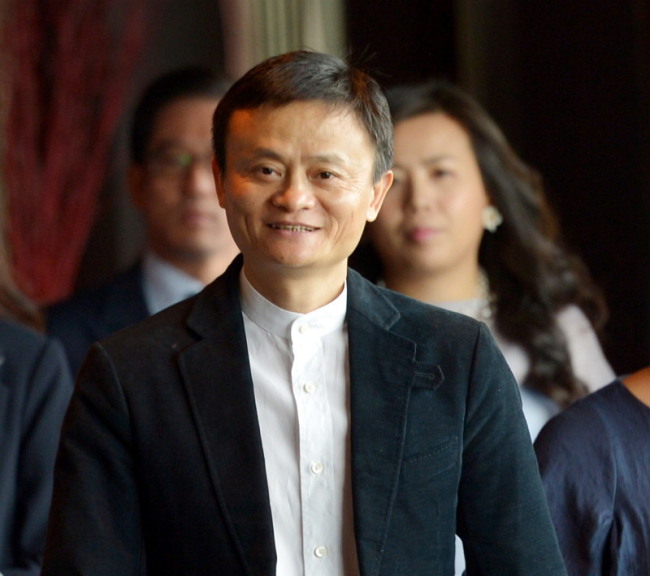[SUPER RICH] Jack Ma enters Korean market to expand Alibaba empire
By Korea HeraldPublished : May 26, 2015 - 20:38
Jack Ma, the chairman and founder of Alibaba Group Holding Ltd. who holds assets worth $36.4 billion, visited South Korea for the third time on May 17 to announce the launch of the Korea Pavilion on T-Mall, a business-to-consumer online retail channel.
T-Mall is a profitable business for Alibaba Group Holding Ltd., with gross merchandise volume of 763 billion yuan (about $123 billion) last year.
The Korea Pavilion, which opened May 18, deals with Korean retail items. The decision stems from the popularity of Korean products in China ― an employee at Alibaba Group Holding’s overseas business team stated that a Korean herbal cosmetics brand was their best-selling item during China’s Singles’ Day on Nov. 11 last year.
T-Mall is a profitable business for Alibaba Group Holding Ltd., with gross merchandise volume of 763 billion yuan (about $123 billion) last year.
The Korea Pavilion, which opened May 18, deals with Korean retail items. The decision stems from the popularity of Korean products in China ― an employee at Alibaba Group Holding’s overseas business team stated that a Korean herbal cosmetics brand was their best-selling item during China’s Singles’ Day on Nov. 11 last year.

The T-Mall Korea Pavilion plans to attract Chinese customers by offering popular Korean products on their online retail website.
But profit appears to be just one reason behind Ma’s decision to enter the Korean market. It appears that Ma has decided to use the Korean market as a testing ground to realize his vision of fostering Alibaba Group Holding Ltd. as a giant cultural empire beyond online retail.
At the Korea Pavilion opening ceremony held at the Korea Agro-Fisheries & Food Trade Corp. on May 18, Ma expressed delight in opening an online mall where Chinese customers can shop for authentic Korean products in one place.
His use of the word “authentic” is noteworthy, showing his determination to use the Korea Pavilion to steer away from controversy over counterfeit products being sold through Alibaba channels.
Alibaba has faced allegations that nearly half of the goods exchanged through several of their e-commerce sites are counterfeit.
The Chinese government has also accused Alibaba Group’s e-commerce site Taobao of selling counterfeit products and failing to track them down effectively.
Ma addressed the issue at the opening ceremony, stating that counterfeit products have been one of the biggest problems in the Chinese market, and adding that Alibaba Group has drastically reduced the sale of counterfeit goods through 10 years of effort.
At the Asian Leadership Conference held last Tuesday at Hotel Shilla, Ma also said that “in order for corporations to survive for over 30 years, they must solve social issues,” and emphasized that Alibaba Group had created 14 million jobs. His statements reflect Ma’s additional plans for the South Korean market in addition to opening the Korea Pavilion.
Ma appears interested in luring Korean youths as core followers of Alibaba, and announced that the group would offer a paid internship program in China specifically for Korean graduates, starting in July.
Ma said Alibaba valued the potential growth of those in the younger generation who are setting out to create their own jobs, and that the program would target young Koreans in order to invest in their talent.
Students who have gone through internships with Alibaba Group Holding Ltd. and start their own business are likely to sell their products through the T-Mall Korea Pavillion, as they would have learned how to best navigate the company’s online platform.
Ma has also shown an interest in supporting tech start-ups run by young Korean entrepreneurs, signaling a possible cultural shift where Alibaba Group financially supports Korean start-up companies, while securing them as loyal customers.
In addition to reinventing its image and finding new target audiences, Ma’s other business decisions seem to suggest that he views Korea as an eventual partner for his emerging cultural content business.
Ma has been investing heavily in the sports and entertainment industry in China. Since March 2014, Ma has reportedly invested about $3.3 billion in cultural and entertainment-related businesses.
Recently, Ma’s private equity firm Yunfeng Capital and Dalian Wanda Group chairman Wang Jianlin invested 800 million yuan ($129 million) on Chinese online entertainment company LeTV, specifically on LeTV Sports.
LeTV Sports is one of the largest sports channels in China, with broadcasting rights for 121 international sports competitions.
With the investment, Yunfeng Capital holds 7.8 percent of LeTV Sports’ shares, while Wang has 11.4 percent of the shares.
Chinese investment experts speculate that Ma’s investments were a necessary component in building his “cultural empire,” and stated that Ma may likely be looking for an innovative business model in the sports and entertainment sectors.
Jack Ma’s Korean entrance may simply appear to be an expansion into another major Asian market, but behind his decision is an elaborate plan to reinvent his company’s tarnished brand image, reaching out to potential customers through job creation and financial support, and branching out its business into new areas that include culture and entertainment.
Ma’s plan has likely been in the works for a significant amount of time, evidenced by the wall-sized Alibaba Group Holding Ltd. advertisement at an exit of Myeongdong Station.
The ad, which had been on display for several months, featured both Korean and Chinese slogans, signaling its intent to appeal to Koreans and Chinese.
By The Korea Herald Superrich Team (sangyj@heraldcorp.com)
Kwon Nam-keun, Hong Seung-wan, Sung Yeon-jin, Bae Ji-sook, Yoon Hyun-jong, Min Sang-seek, Kim Hyun-il, Sang Youn-joo
-
Articles by Korea Herald



![[Herald Interview] 'Amid aging population, Korea to invite more young professionals from overseas'](http://res.heraldm.com/phpwas/restmb_idxmake.php?idx=644&simg=/content/image/2024/04/24/20240424050844_0.jpg&u=20240424200058)















![[Today’s K-pop] Kep1er to disband after 2 1/2 years: report](http://res.heraldm.com/phpwas/restmb_idxmake.php?idx=642&simg=/content/image/2024/04/25/20240425050792_0.jpg&u=)